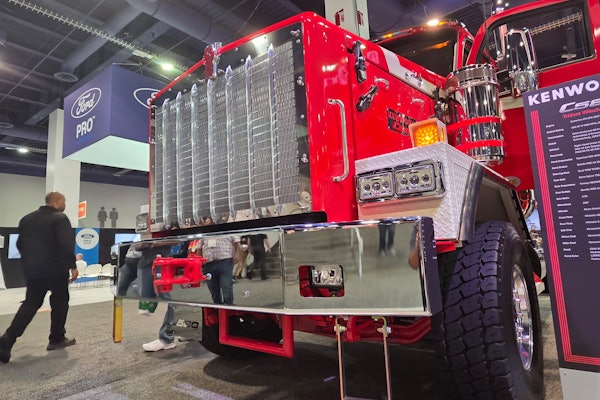Trucking news and briefs for Thursday, June 15, 2023:
Biden vetoes resolution to kill latest EPA truck emissions regs
President Joe Biden on June 14 vetoed a resolution that passed in the U.S House and Senate that would have nullified the Environmental Protection Agency’s Heavy-Duty Truck Rule, which was announced in December and took effect in March.
The rule establishes emission limits for nitrogen oxide (NOx) from commercial trucks beginning with the 2027 model year, tightening tailpipe NOx limits to a level 80%-plus below the current standard and reducing the particulate matter limit by 50%. The agency also will require that OEMs extend warranties to 450,000 miles from 100,000 and useful life limits to 650,000 miles from 435,000 miles.
The resolution first passed the Senate in April, followed by the House in May.
In vetoing the resolution, Biden said EPA’s rule “cuts pollution, boosts public health, and advances environmental justice in communities across the country. It will prevent hundreds, if not thousands, of premature deaths; thousands of childhood asthma cases; and millions of missed school days every year.”
He added that the resolution would have denied “communities these health benefits by resulting in weaker emissions standards for heavy-duty vehicles and engines, which are significant sources of pollutants that threaten public health. If enacted, the resolution would squander $36 billion in benefits to society -- and an opportunity to lead on the defining crisis of our time.”

[Related: The fight over EPA Phase 3 emissions regs]
FMCSA revives exploration of proficiency test for new carriers
A rulemaking that has been dormant since 2009 is back on the Federal Motor Carrier Safety Administration’s radar.
In the Department of Transportation’s latest regulatory agenda, a date has been added to a potential rulemaking that would consider methods for ensuring a new applicant carrier is knowledgeable about the applicable safety requirements before being granted New Entrant authority. FMCSA is considering whether to implement a proficiency examination as part of its revised New Entrant Safety Assurance Process, as well as other alternatives.
According to the agenda, a supplemental advance notice of proposed rulemaking (ANPRM) will be published in August. The agenda only mentions new entrant carriers -- and not brokers and freight forwarders -- but because the new ANPRM is listed as supplemental, changes could be made to the original ANPRM. FMCSA said in a statement to Overdrive it could not provide additional information as to whether the supplemental ANPRM would also include information related to a proficiency exam for brokers.
An advance notice of proposed rulemaking related to a proficiency exam for new entrant carriers was originally published in August 2009. It said that the Motor Carrier Safety Improvement Act of 1999 required a two-pronged approach to improving the safety performance of new entrant carriers. The first prong, in section 210(a) involved safety audits within the first 18 months of authority, which has been in effect. Second, the law in section 210(b) directed the DOT Secretary “to ensure applicants for New Entrant authority are knowledgeable about applicable federal safety requirements before receiving operating authority,” and consider a proficiency exam and other requirements.
Notably, MAP-21 legislation in 2012 also mandated proficiency exams for freight middlemen like brokers and freight forwarders as well as carriers. In the wake of MAP-21's passage, a presentation by then-Administrator Anne Ferro outlined a date in 2014 for possible implementation of the new standards, which would have required brokers/forwarders to "employ, as an officer, an individual who provides to the Secretary with satisfactory evidence of related rules, regulations, and industry practices" before a grant of authority.
[Related: FMCSA/DOT getting serious about double brokering?]
FMCSA told Overdrive that it has moved the action from "Long Term" status to "active" status "as a sign we intend to move forward with implementing section 210(b) of the Motor Carrier Safety Improvement Act," adding that the delay was due to other priorities since 2009, including hours of service changes in 2011, 2013 and 2020, the Unified Registration System, the ELD mandate, the Drug and Alcohol Clearinghouse, and Entry-Level Driver Training.
The 2009 carrier-related ANPRM said that a 2003 rulemaking establishing the 18-month audit program did not include a proficiency exam, but instead required applicants to certify, on Form MCS–150A, that they were knowledgeable of the federal safety regulations and hazmat regulations.
The previous ANPRM sought information on the feasibility of establishing a proficiency exam, recommendations on testing protocols and how the test would be administered, which carrier employees should be required to take the exam, and more.
At the time of the previous ANPRM, the Owner-Operator Independent Drivers Association was opposed to a proficiency exam for new entrants, stating that “FMCSA would achieve far more in terms of reducing the number of truck crashes and generally improving safety levels among those operating large trucks on the nation’s highways by collecting and reviewing detailed information about applicants before any authority, even new entrant authority, is granted.”
The American Trucking Associations, on the other hand, supported the effort, recommending “that owners or principals of new entrant firms, both interstate and intrastate, be required to satisfactorily complete a safety curriculum based on uniform nationwide standards before commencing operation.”
[Related: 'WTFFMCSA': Carriers mocking the agency through its own registration system?]
Eight state DOTs launch autonomous forum
Just as California inches its way toward a formal ban on driverless commercial trucks, eight states' departments of transportation are joining together to develop an online community where public and private sector autonomous vehicle (AV) stakeholders can share information, align needs and collaborate on activities.
AccelerateAV.org, which launched June 15, is intended as a free and open forum to all AV ecosystem stakeholders and was initiated by the AV Pooled Fund, which is made up of DOTs from Connecticut, Maryland, Michigan, Minnesota, Ohio, Pennsylvania, Texas and Virginia. The states joined forces in 2020 to try to align the needs of the AV industry with the abilities of state DOTs to assist with those needs.
The multi-functional platform is designed to allow for user networking, collaboration, consultation and resource sharing. Users can join conversations, search for other users, share news and events, or participate in events and discussions.
The AV Pooled Fund hired the 501(c)(3) nonprofit Partners for Automated Vehicle Education (PAVE) to build the site. PAVE held focus groups of AV stakeholders and distributed a survey to hundreds of prospective forum users in designing a site that would be most useful to all participants.
[Related: Calif. bill requiring drivers in autonomous trucks advances]









